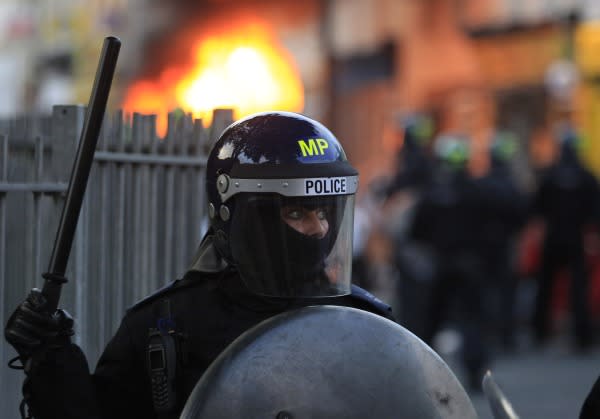 The Cutline
The CutlineHow social media took a back-seat to BlackBerry BBMs in fueling the London riots

The so-called Arab Spring of uprisings in North Africa and the Middle East--beginning in December in Tunisia--gained important momentum from the protestors' use of social media. Arab youth would coordinate demonstrations and enlist support via Facebook and Twitter. And ever since, the tendency in the media has been to credit--or blame--social media for sparking similar demonstrations.
But the riots that erupted in London over the weekend--injuring 35 police officers, leading to 160 arrests--were largely fueled by something less social: BlackBerry Messenger (BBM).
The free instant message service--which requires BlackBerry users to exchange pin numbers--was used by Tottenham youth to mobilize in their clash with police. In part, the Tottenham rioters used BBM because the service is a private channel--unlike Facebook and Twitter.
"Because Twitter is a public forum, rioters and looters were sensibly wary of bragging publicly about the crime they were committing," Anna Leach wrote in a blog post.
Which is not to say the Tottenham protestors bypassed Twitter altogether. They used the popular micro-blogging platform to report news of the riots--and to spread BBM pin numbers.
The protests began on Saturday as a peaceful vigil for Mark Duggan, who was fatally shot by police on Thursday. "This has changed from a local issue into organized criminality," police deputy assistant commissioner Steve Kavanagh said Monday, promising "momentous operation" to arrest the rioters. (Kavanagh said he would consider arresting Twitter users who appeared to incite violence.)
But according to the AP, as many as 500 people gathered around Tottenham's police station in north London, turning the planned vigil into a violent protest. Smaller "copycat" riots broke out in Enfield and Brixton on Sunday.
London's Telegraph reported that rioters used BBM group chats in their efforts to loot and elude police, and Twitter was the place to find the pin numbers to participate.
"BlackBerry phones have a reputation for being worn in the belt holsters of power-suited executives," CNET noted. "But they're also popular with da yoof, thanks to BBM." Younger users have also adopted BlackBerries thanks to the service's price point, which is significantly lower than the iPhone's.
BlackBerry, for its part, issued a statement on the riots:
"We feel for those impacted by the riots in London. We have engaged with the authorities to assist in any way we can."
The statement, ironically, was released on Twitter (though its ungrammatical use of "impact" as a verb is endemic to nearly all digital platforms).
That the provider of a central wireless platform itself uses multiple platforms to get its message out is an important reminder that sweeping assertions about the dominance of one brand of social media--like this one ("How Blackberry, not Twitter, fuelled the fire under London's riots") by TechCrunch Europe--are inherently misleading.
The rioters clearly used both. It's just that in this particular uprising, Twitter appears to have supplemented the organizational efforts of BlackBerry users, rather than serving as the central channel of communication.
